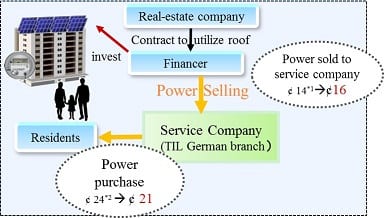Toshiba intends to utilize a new business model in Germany under which it will install and operate self-consumption solar power systems for residents of apartment buildings. It intends to sell the power to the residents of these buildings at a lower price than utility companies do. The system will consist of batteries and the μEMS micro energy management system.
 Toshiba will launch this system in March and install 3 MW of solar panels for 750 apartments operated by GAGFAH, a German real estate company in Villingen-Schwenningen and Ostfildern. The apartment buildings are all located in Barten-Wuerttemburg. Toshiba also hopes to increase capacity from 3 MW at the start to 100 MW by 2016.
Toshiba will launch this system in March and install 3 MW of solar panels for 750 apartments operated by GAGFAH, a German real estate company in Villingen-Schwenningen and Ostfildern. The apartment buildings are all located in Barten-Wuerttemburg. Toshiba also hopes to increase capacity from 3 MW at the start to 100 MW by 2016.
This is reminiscent of the business model solar leasing companies such as SolarCity, Sunrun, Sungevity, and others use. Residents can call these companies, have them install solar panels at no initial cost (or little initial cost), and then pay a fraction of what their electricity bill used to be for the solar-generated electricity. However, these companies serve single-family homes with their own roofs. Toshiba’s entry into the realm of apartment buildings, to be funded and owned by a group of pension funds, is potentially huge.
However, worth noting is that Germany’s electricity policies are important to the enabling of this option. Toshiba writes:
Although Germany introduced a feed-in tariff system for renewable energy in 2000, and while the adoption of photovoltaic (PV) power has increased, consumers have recently seen higher electricity bills every year, along with a lower feed in price for surplus solar power. Germany is seeking solutions to this by deregulating its energy market, separating power generation and transmission, and independent power providers can now participate and deliver electricity. Toshiba is responding with a new on-site consumption model that will operate independently of the feed-in tariff system, and that is expected to reduce burden on the regional gird and the environment.
But Toshiba and its partners don’t intend to stick solely with this solar power scheme. They also want to expand into the related energy management realm.
Going forward, it will also install stationary batteries and integrate a micro energy management system, μEMS, to realize an integrated solution. Toshiba’s goal is to develop a self-sufficient model for on-site consumption that delivers solar-power electricity day and night, and apply it to a service business that supports energy management on a real-time basis. In developing its smart-grid related business at the global level, Toshiba will promote the integration and use of dispersed power sources that match local needs and conditions.
Originally published on CleanTechnica. Reproduced with permission.
Read more at http://cleantechnica.com/2013/12/09/toshiba-build-operate-solar-systems-germany/#DybJ8tlorfhDpKH6.99







